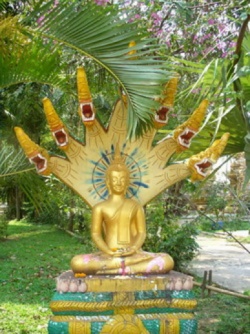Muccalinda Sutta: About Muccalinda
Muccalinda Sutta: About Muccalinda
I have heard that on one occasion, the Blessed One was staying at Uruvelā on the bank of the Nerañjarā River at the root of the Muccalinda tree, newly awakened. And on that occasion he sat for seven days in one session, sensitive to the bliss of release.
And on that occasion a great, out-of-season storm-cloud rose up, with seven days of rainy weather, cold winds, & intense darkness. Then Muccalinda the nāga king — leaving his dwelling place and encircling the Blessed One's body seven times with his coils — stood with his great hood spread over the Blessed One, (thinking,) "Don't let the Blessed One be disturbed by cold. Don't let the Blessed One be disturbed by heat. Don't let the Blessed One be disturbed by the touch of flies, mosquitoes, wind, sun, & creeping things."
Then, with the passing of seven days, the Blessed One emerged from that concentration. Muccalinda the nāga king, realizing that the sky had cleared and was free of clouds, unraveled his coils from the body of the Blessed One, dropped his own appearance and, assuming the appearance of a young man, stood in front of the Blessed One with hands before his heart, paying homage.
Mucalinda, Muchalinda or Mucilinda is the name of a naga (a snake-like being), who protected the Buddha from the elements after his enlightenment.
It is said that four weeks after Śākyamuni Buddha began meditating under the Bodhi tree, the heavens darkened for seven days, and a prodigious rain descended. However, the mighty king of serpents, Mucalinda, came from beneath the earth and protected with his hood the one who is the source of all protection. When the great storm had cleared, the serpent king assumed his human form, bowed before the Buddha, and returned in joy to his palace.
